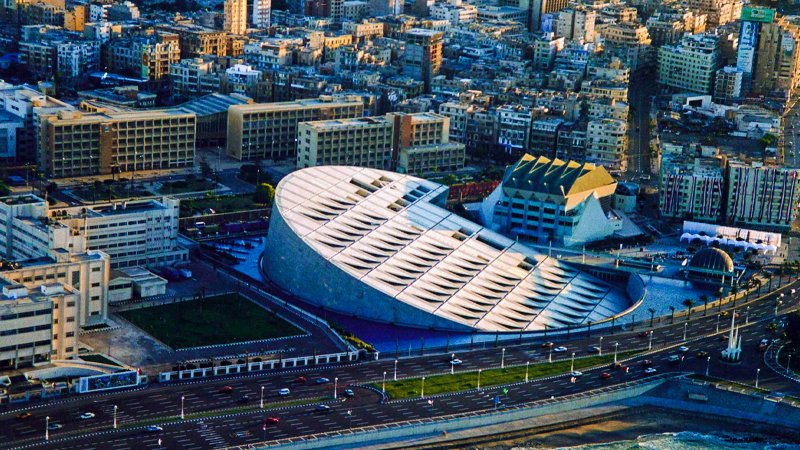Egypt, a land steeped in ancient history and cultural treasures, was once home to a marvel that transcended time – the Library of Alexandria. This legendary institution, renowned for its vast collection of knowledge and scholarly pursuits, stood as a beacon of intellectual enlightenment in the ancient world. While the original library may be lost to history, its legacy continues to inspire and intrigue. Join us on a journey through time as we uncover the secrets of the Library of Alexandria, exploring its origins, its contributions to human knowledge, and the mysteries surrounding its demise.
The Birth of a Cultural Icon: The Founding of the Library
The Library of Alexandria was established in the 3rd century BC during the reign of Ptolemy I Soter, a Macedonian Greek general who became the ruler of Egypt after the death of Alexander the Great. Inspired by Aristotle’s Lyceum in Athens, Ptolemy envisioned a center of learning that would attract scholars from across the known world. He commissioned the construction of a magnificent building complex, which housed not only a vast collection of scrolls and manuscripts but also research facilities, lecture halls, and gardens. The library quickly became a hub of intellectual activity, drawing scholars, philosophers, scientists, and poets who sought to expand their knowledge and contribute to the advancement of human understanding.
A Treasure Trove of Knowledge: The Library’s Collection
The Library of Alexandria’s collection was truly remarkable, encompassing works on a wide range of subjects, from philosophy, science, and mathematics to literature, history, and medicine. Scholars painstakingly copied and translated texts from across the ancient world, amassing an estimated half a million scrolls. The library’s collection included works by renowned figures such as Homer, Plato, Aristotle, Euclid, and Archimedes. It was a repository of knowledge that surpassed anything seen before, and it became a pilgrimage site for scholars and intellectuals from far and wide.
A Hub of Scholarship and Innovation: The Library’s Impact
The Library of Alexandria was more than just a repository of knowledge; it was a vibrant center of scholarly activity and intellectual exchange. Scholars from diverse backgrounds collaborated on research projects, debated philosophical ideas, and made groundbreaking discoveries in various fields. The library’s scholars are credited with significant advancements in astronomy, mathematics, medicine, and geography. For example, Eratosthenes, the library’s chief librarian, calculated the circumference of the Earth with remarkable accuracy. The library also fostered the development of literary criticism and textual scholarship, as scholars meticulously studied and preserved ancient texts.
The Mysterious Demise: The Fall of the Library
The Library of Alexandria’s fate remains shrouded in mystery and controversy. Various theories have been proposed, ranging from accidental fires to deliberate destruction by invading armies. One of the most common accounts attributes the library’s destruction to Julius Caesar, who set fire to the Egyptian fleet in the harbor during his civil war with Cleopatra. The fire is said to have spread to the city, causing significant damage to the library. However, other accounts suggest that the library may have survived this incident and continued to function for centuries, albeit in a diminished capacity.
Legacy and Rebirth: The Library’s Enduring Influence
Despite its uncertain fate, the Library of Alexandria’s legacy continues to inspire and captivate. Its reputation as a center of knowledge and intellectual pursuit has endured through the ages, and it remains a symbol of the importance of preserving and sharing information. In recent years, there have been efforts to revive the spirit of the ancient library through the establishment of the Bibliotheca Alexandrina, a modern library and cultural center built on the site of the original library. The Bibliotheca Alexandrina houses a vast collection of books, manuscripts, and digital resources, and it strives to foster a spirit of intellectual inquiry and cultural exchange, just as the ancient library did.
Visiting Alexandria: Tracing the Footsteps of History
Modern-day Alexandria, a vibrant port city on the Mediterranean coast, offers visitors a chance to explore the remnants of its glorious past. While the original Library of Alexandria is no longer standing, the Bibliotheca Alexandrina stands as a testament to its enduring legacy. The city also boasts a wealth of other historical and cultural attractions, including the Roman amphitheater, the Catacombs of Kom El Shoqafa, and the Pompey’s Pillar. As you wander through Alexandria’s streets, you can’t help but feel the echoes of its illustrious past, when it was a center of learning, culture, and trade.
Conclusion: The Library of Alexandria’s Enduring Allure
The Library of Alexandria, though lost to history, remains a symbol of human curiosity, intellectual pursuit, and the power of knowledge. Its legacy continues to inspire scholars, researchers, and curious minds around the world. As you plan your journey to Egypt, consider visiting Alexandria and exploring the traces of this legendary institution. Let the spirit of the ancient library spark your imagination and ignite your passion for learning.

